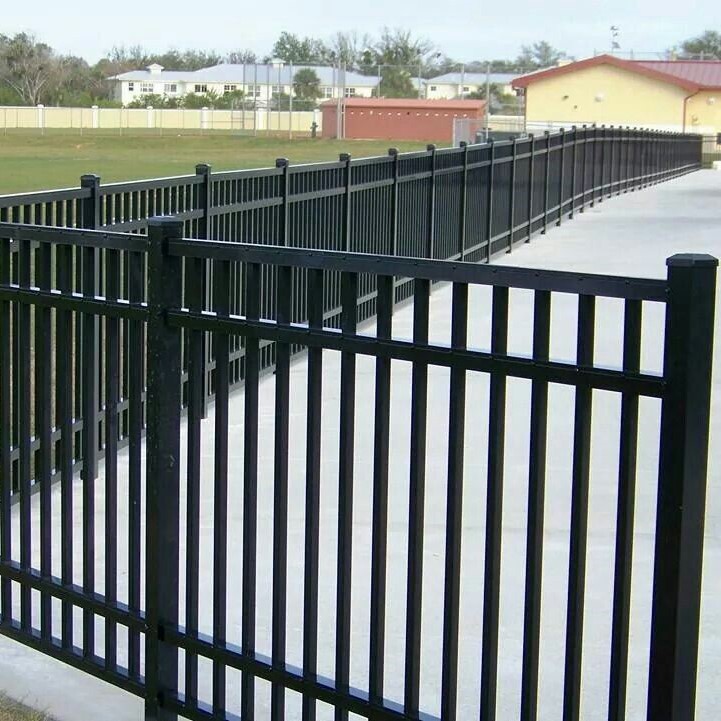1. Steel Fences Steel is one of the popular materials u […]

1. Steel Fences
Steel is one of the popular materials used in industrial fencing due to its strength, durability, and resistance to damage. Steel fences are highly effective in securing large areas, making them ideal for factories, warehouses, and distribution centers.
A. Types of Steel Fences
Chain Link Steel Fencing: One of the common types, chain link fences are made from galvanized steel wire woven into a diamond pattern. These fences provide a strong barrier while maintaining visibility. They are often used for large industrial sites, storage yards, and security applications.
Welded Steel Fencing: Welded steel fences are made from steel panels welded together for additional strength and durability. These fences offer more security than chain link fences and are less likely to be damaged by impact or tampering.
B. Advantages of Steel Fences
Strength and Durability: Steel fences are resistant to impacts, corrosion, and wear, making them suitable for high-security environments.
Low Maintenance: Steel requires minimal maintenance once installed, especially if it is galvanized or coated to prevent rusting.
Versatile Design: Steel fences can be customized to meet the specific needs of the industrial site, including the addition of barbed wire, razor wire, or other security features.
C. Disadvantages of Steel Fences
Cost: Steel fences can be more expensive than other materials, although the investment is justified by their long lifespan and security benefits.
Weight: Steel fences can be heavier and more difficult to handle during installation.
2. Wrought Iron Fences
Wrought iron is a durable, decorative metal that provides a premium look while maintaining high security. It is commonly used in high-end commercial or industrial properties where aesthetics and security are both important.
A. Features of Wrought Iron Fences
Ornamental and Secure: Wrought iron fences are often designed with decorative elements, such as scrolls and intricate patterns, making them ideal for businesses that want to project a strong, elegant image while ensuring security.
Customizable: Wrought iron fences are highly customizable in terms of design, and they can be manufactured to fit a variety of styles and architectural themes.
B. Advantages of Wrought Iron Fences
Longevity: Wrought iron is known for its strength and long lifespan, making it a great choice for high-security industrial properties.
Aesthetic Appeal: Its decorative nature makes it a preferred option for industrial properties that are located in highly visible areas or in urban settings.
C. Disadvantages of Wrought Iron Fences
Cost: Wrought iron is more expensive compared to other materials like chain link or wood.
Maintenance: While durable, wrought iron requires periodic maintenance, including painting or coating to prevent rust.
3. Vinyl Fences
Vinyl fences are becoming increasingly popular in industrial fencing due to their low maintenance and long-lasting durability. Made from high-quality PVC, these fences offer an attractive alternative to metal fences in certain industrial applications.
A. Features of Vinyl Fences
Non-corrosive: Unlike metal fences, vinyl fences will not rust, even when exposed to the elements. This makes them a great choice for industries located in humid or coastal areas.
Privacy: Vinyl fences are often designed as solid panels, making them ideal for applications where privacy is a concern.
B. Advantages of Vinyl Fences
Low Maintenance: Vinyl fences do not require painting or staining, and they are resistant to mildew, fading, and cracking.
Durability: Vinyl is highly resistant to weather conditions and can maintain its appearance for years with little upkeep.
Aesthetic Appeal: Available in various colors and designs, vinyl fences can offer a clean and professional look for industrial properties.
C. Disadvantages of Vinyl Fences
Impact Resistance: While durable, vinyl fences can crack or break when subjected to heavy impact or conditions.
Cost: Vinyl fences can be more expensive upfront than wood or chain link options.
4. Wooden Fences
Wooden fences offer a natural, traditional look and are sometimes used in industrial fencing for specific applications, such as separating property lines or providing privacy. However, they are generally less common in industrial settings compared to metal or vinyl options due to their maintenance requirements and susceptibility to weathering.
A. Features of Wooden Fences
Natural Look: Wooden fences can blend well with the surroundings, offering a natural aesthetic that some industrial sites might prefer.
Customization: Wood is highly customizable in terms of height, style, and design, allowing for more flexibility compared to some other materials.
B. Advantages of Wooden Fences
Affordability: Wood tends to be less expensive than many metal fencing options, making it a cost-effective choice for certain industrial applications.
Privacy: Wooden fences are often used in high-privacy applications, especially when solid panels are used to block views.
C. Disadvantages of Wooden Fences
Maintenance: Wood requires regular maintenance, such as staining, sealing, or painting, to protect against the elements, rot, and pest damage.
Durability: Wooden fences may not be as long-lasting as metal options, especially in harsh weather conditions.
5. Chain Link Fences
Chain link fences are a popular choice for industrial properties due to their cost-effectiveness, ease of installation, and functional performance. Made of galvanized steel wire woven into a diamond pattern, chain link fences are typically used in industrial settings for security purposes.
A. Features of Chain Link Fences
Open Visibility: Chain link fences provide a clear view of the area being secured, which is beneficial for surveillance and monitoring purposes.
Cost-Effective: They are one of the budget-friendly fencing options, especially for large industrial properties.
B. Advantages of Chain Link Fences
Security: Chain link fences provide a secure boundary without obstructing visibility, making them ideal for facilities that need to maintain visibility for security reasons.
Low Maintenance: Once installed, chain link fences require very little maintenance, especially if they are galvanized or coated to resist rust.
Customizable Heights and Features: Chain link fences can be customized with additional features such as barbed wire or privacy slats to enhance security.